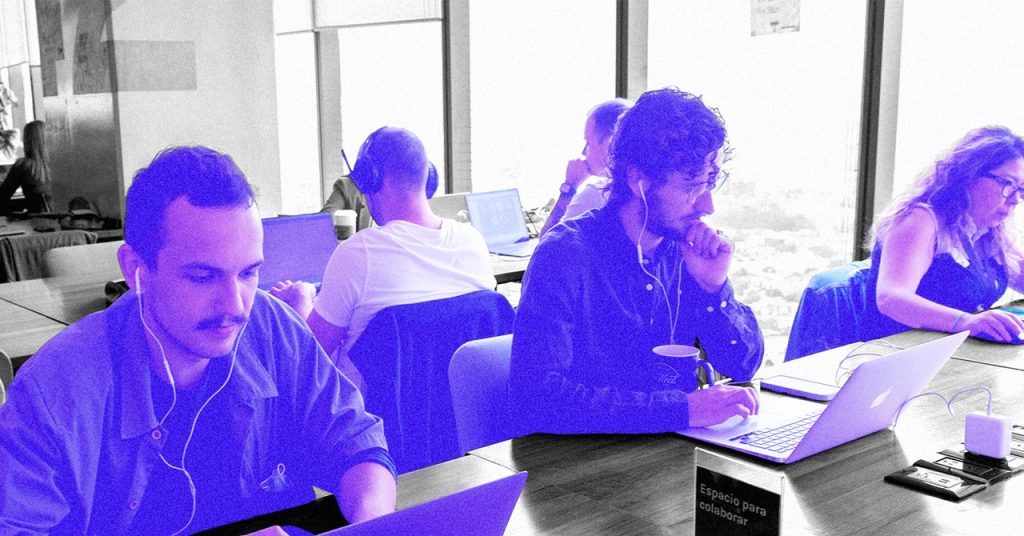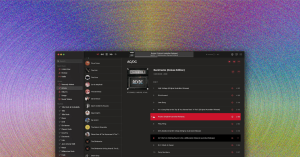The Virtual Villages Helping Digital Nomads Find Real-World Friends

Nov 26, 2024 8:00 AM
The Virtual Villages Helping Digital Nomads Find Real-World Friends
“Anyone want to meet up for some steak?” This was the message posted by a man named David in the Digital Nomads Buenos Aires Facebook group five years ago. I responded, and upon meeting in the leafy Palermo neighborhood, David and I bonded instantly, became thick as thieves, and have since solidified our friendship with reunions in places like Zurich and Playa del Carmen, a bonafide digital nomad hot spot.
Loneliness is one of the challenges of the digital nomad lifestyle, where location-independent professionals travel while working online. However, a variety of virtual communities are helping these remote workers see the world and make friends along the way. There are online conferences where participants Zoom in from everywhere, digital nomad subreddits, and Slack channels where folks can connect. There are also city-specific Facebook groups like Rio Digital Nomads for people living and working in Rio de Janeiro, Brazil.
While I lived in Playa del Carmen on Mexico’s Caribbean coast as a digital nomad, WhatsApp groups were the lifeblood of my peripatetic existence. There were WhatsApp channels for all sorts of meetups, whether it was board games, ice baths, or sunrise sessions with modern mystics.
Belgian entrepreneur Julie Renson similarly made use of WhatsApp groups while she lived in Playa del Carmen, relying on communities like “Beach Volley in PDC” and “Salsa and Bachata” to fortify her in-real-life social network. She has also lived in warm weather spots like Ivory Coast, Panama, and Thailand, and employs various buddy-building strategies depending on the location.
“Bangkok, for example, has a lot of MeetUp and Facebook groups, but some places like Marrakech don’t have a lot going on,” she says. In those lesser-trammeled places, she posts on Facebook groups before arriving, sharing her travel dates. “Honestly, for me, the best way to meet people is to go to events I find online, which is probably why I’m now working on a tool, Tukioo, that allows people to meet and go to them together,” Renson says. “People are what will make your experience magical.”
Far-Flung Friendships
When she’s living in Portugal’s capital, a haven for digital nomads, British citizen Saskia Hadley uses the Facebook group Lisbon Digital Nomads & Expats. “Having been remote for the best part of 10 years, Facebook groups are a great fallback when you need a hive mind,” she says. Hadley is the chief marketing officer of Noma Collective, a group travel company that provides people with a plug-and-play community of other remote workers in countries including Belize, Kenya, and Sri Lanka. She also typically joins specific-interest Facebook groups like hiking, kickboxing, or European parties to make the most of her location independence.
Connection-seeking nomads also turn to premium, purpose-built communities—some of them with member rolls numbering in the thousands. Nomads.com (formerly NomadList) costs $200 to join, and it is the first port of call for many working wanderlusters, as it gives a popularity ranking of various nomad destinations along with a solid breakdown of living costs, the safety of the locale, and the availability of good Wi-Fi. The members-only platform has an active Telegram chat and hosts as many as 400 meetups per year across the globe. For roving female business owners looking to tap into a peer network, Digital Nomad Girls offers a “virtual sisterhood” with over 39,000 members for $100 per month or $600 annually. Perks include a monthly book club, sharing circles, tandem digital decluttering, and a platform to invite would-be friends on adventures.
While some digital nomads are content mingling during internet-enabled happy hours and Zoom coworking sessions, many of these virtual communities see real-world get-togethers as the end game. This is the case with NomadBase, an online community that for the past two years has assembled borderless workers in Tarifa, Spain, for three weeks of kite surfing, aerial yoga, communal dining, and networking.
NomadBase was founded by Johannes Voelkner, who is also behind Nomad Cruise, the world’s first conference at sea for digital nomads. “Life as a digital nomad can be very isolated,” Voelkner says, “but our program helps nomads become part of an incredible community of like-minded people in a short time.”
Danish Soomro is the founder of Digital Nomads Around the World—the largest private Facebook community of digital nomads—and has hosted numerous meetups globally, from beach parties in Mexico to coworking days in Lisbon. “I personally host dinner parties in every city I go to and recently had a great ‘meet-and-eat’ in Tbilisi,” he says. Soomro, a veteran nomad, created the Facebook group in 2014. It has since grown into a 195,000-strong resource and community which he manages with the help of a remote team and Meta AI’s communication tools.
Soomro is all in on generative AI and other emerging tech advances. He runs a range of other nomad-friendly online businesses, including an automated bookkeeping service and a tool content creators can use to generate video reels narrated by an AI clone of their voice. “We’re exploring VR meetups and AI-powered matchmaking for coworking, coliving, dating, and dinner parties around the world,” he says. “As a nomad myself, I understand how challenging it can be to form long-term relationships when you’re constantly on the move.”
One of the most prominent names in the digital nomad matchmaking game is Aline Dahmen. Nine years ago, she created Nomad Soulmates as a Facebook group. The group morphed into a company that makes its own social app. Its offerings have broadened too, now encompassing a dating app, in-person meetups, and online speed dating events every two months. The company now has roughly 30,000 members worldwide across its platforms.
“The app was created because, unlike the Facebook group, your profile won’t get lost in a feed once you’ve created it,” Dahmen says. The app is free, but singles can purchase ice-breakers that are used to direct-message people they haven’t matched with. The company has also expanded to include two cofounders, Kimberly Koehler and Sebastien Pelletier, who even met his wife through the platform. Dahmen says this is common, and that she’s heard from numerous couples who have met on the platform and started families together.
Nomads who aren’t looking for love but still crave a meaningful connection with others living the itinerant lifestyle can turn to Fairytrail. It recently transitioned from a dating app—with popular fairy tale characters mapped to Myers Briggs and Enneagram types—to a buddy app for nomads, remote workers, and vanlifers.
With such far-reaching virtual communities, work-from-anywhere travelers have the potential to find their heart’s desires, whether they’re seeking companionship, a romantic happily-ever-after, or just a great meal in Buenos Aires.
Source: https://www.wired.com


